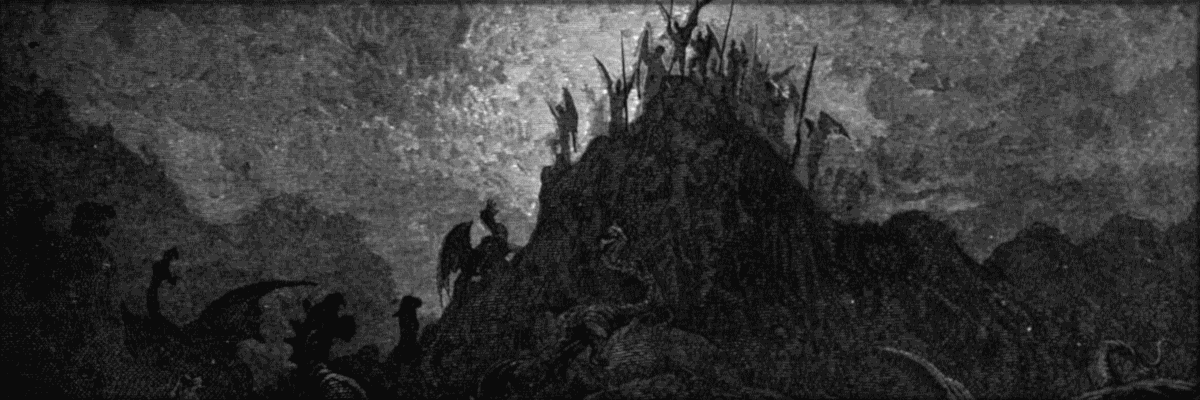
Return to homepage: Gothica
Soul first came into being at the creation of everything. It is the remnant of the primordial element that, through Reisolus’ crafting, gave rise to all creation. Yet from that first creation, soul did not cease to form. Each being in creation gives rise to more of this element, this spirit, this manna, this soul.
Any reader acquainted with the properties of soul can see a problem here. If all life is giving rise to more and more soul, then undoubtedly, in time, magic will become unpredictable. It will occur at random, to random people, and in random ways. Yet, this hasn’t happened.
Although his motives are obscure to mortals, Reisolus surely foresaw this eventual excess of soul, and may have created demons in response. After all, it is well known that demons feed upon soul, and to all knowledge are the only method of its disposal without the use of magic. However some debate exists whether demons are indeed beings of Reisolus’ creation. Perhaps they are the descendants of some unknown, countermanding force at the dawn of creation, in mathematical terms, the normal against which the push of creation must press. Such speculation is moot and best left to the theologians. The point of ultimate importance is that demons, by their very nature, prevent the excessive buildup of soul. Therefore, although largely evil with respect to their relationship to mankind, demons still play a necessary role in the Grand Design.
Although all living beings shed soul in small quantities throughout their lives, sentience is required to make use of it because it requires will. One must simply will an event to occur, and if the sufficient sacrifice of soul is made, then it will occur.
It seems so simple, and indeed it is so. Many readers, even novices in the magical arts, have likely used magic at one time or another. Indeed the most common use of magic is innate magic, the use of one’s own small reserves of soul for minor wishes. Examples include a mother kissing away the pain of a child’s injury or a run of bad luck affecting an individual that is hated by many. This kind of magic is easily confused with coincidence.
Any greater use of magic requires more soul than can be mustered by an untrained individual at any one time. There are three methods to achieve this: demonic magic, necromancy, and natural magic. Demonic magic is the most straightforward and reliable of the three, yet it is also the most dangerous. It involves the direct purchase of soul from a demon, and the price is often prohibitively steep. Necromancy is the second most reliable method, and involves ritually consuming the residual soul from the dead. Results vary based upon freshness of the dead, manner of death, and relation to the practitioner. The final method, natural magic, is the least reliable and by many is dismissed as entirely unpredictable. There exist some parts of creation in which a concentration of soul has developed. Attempting any magic while in the presence of this concentrated soul will increase the power of the result, but although the magical effect is amplified, it can also be changed. It is the position of the college that for the safety of all involved that natural magic be avoided.
Seemingly magical events have taken place throughout history for which there is no good explanation for the source of soul. These events are rare and often poorly documented. It is the position of the college that in many cases these are the result of natural magic or, were proper documentation made at the time, a demonic or necromantic source would have been discoverable. Miracles, as they are called by the laymen, are therefore best dismissed by any practically-minded mage.
If one practices too much innate magic, a deficiency of soul can develop. This usually manifests when the mage chronically has too little outside soul to achieve the intended effects and must supplement some of their own soul. This can even happen unintentionally.
The first signs are fatigue, loss of appetite, and pallor. This is followed by weight loss, dark circles around the eyes, whitening of the hair, and global frailty. The final stage is a loss of vision, loss of teeth, and loss of sense.
It is important for a mage to recognize the initial stages of soul deficiency and to differentiate them from the sequelae of normal academic eccentricity. Most of the initial effects of this deficiency are readily reversible by ceasing magic use for 6-months to a year. However, the whitening of hair and other more advanced effects are permanent. Care should be taken not to allow progression this far, yet the prevalence of young, white-haired mages, is all one needs observe to know that this best advice is too often ignored.
By contrast, it has been observed that rare individuals exist throughout history who are much loved by the masses and must somehow have access to the reservoir of the masses’ souls. They increase in stature, develop strength of speech and body, gregariousness of humor, and abundance of energy. Such notable individuals maintain this excess of soul in death and their tombs are often targeted by necromancers.